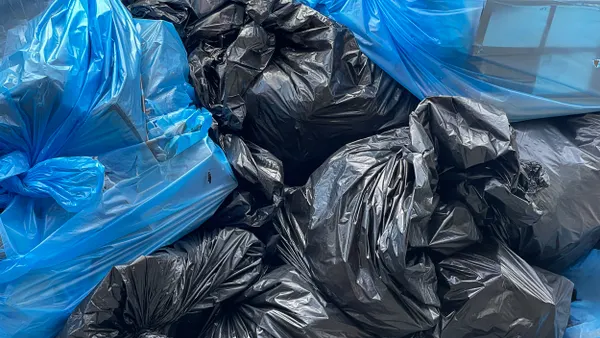Dive Brief:
- The office of New York Mayor Bill de Blasio has announced that nearly 37,000 tons of waste were diverted from landfills or incinerators during the city's five-month Zero Waste Challenge. This includes 24,500 tons of organic material that were composted and 322 tons of donated food.
- Working with local haulers, 31 businesses reached an average diversion rate of 56.5%. Participants were asked to reach at least 50% as part of the challenge and continue their efforts to reach 75% and eventually 90% as part of the city's "zero waste" goals.
- Participants included ABC/Disney, Anheuser-Busch, Barclays Center, Citi Field, The New School, The Waldorf, Viacom, and select Whole Foods locations. A dozen local waste companies such as Action Environmental Services, IESI, and Recycle Track Systems also helped make this possible.
Dive Insight:
The challenge wraps up ahead of new rules for businesses that the city hopes will help make significant progress toward reaching the zero waste goals laid out in last year's OneNYC plan. Certain categories of large businesses will soon be required to divert their organic waste and all commercial businesses will be required to separate their materials for recycling.
As evidenced by the results, this will be easier for some businesses to do than others. About half of the participants reached 75% diversion and only three locations—produce distributor D'Arrigo Bros. and two buildings owned by the Durst Organization—reached 90%. Some progress can be made through internal purchasing and structural changes, but much of it will depend on relationships with local haulers. In addition to periodic waste audits, adequate collection and processing infrastructure will be necessary to ensure that this material is diverted properly.
Some groups in the city have criticized New York's commercial waste industry for not recycling enough, while some haulers have said the city's new goals and rules aren't realistic. Unlike the city's residential recycling program which is stabilized by a long-term contract, commercial recycling processors are more vulnerable to market fluctuations. A lack of regional processing capacity for organics, low commodity prices for materials such as glass, and burdensome regulations are among their complaints.
More information on these issues is expected to come out in a city study of a potential franchise zone system this summer and Waste Dive will continue to follow the story.











